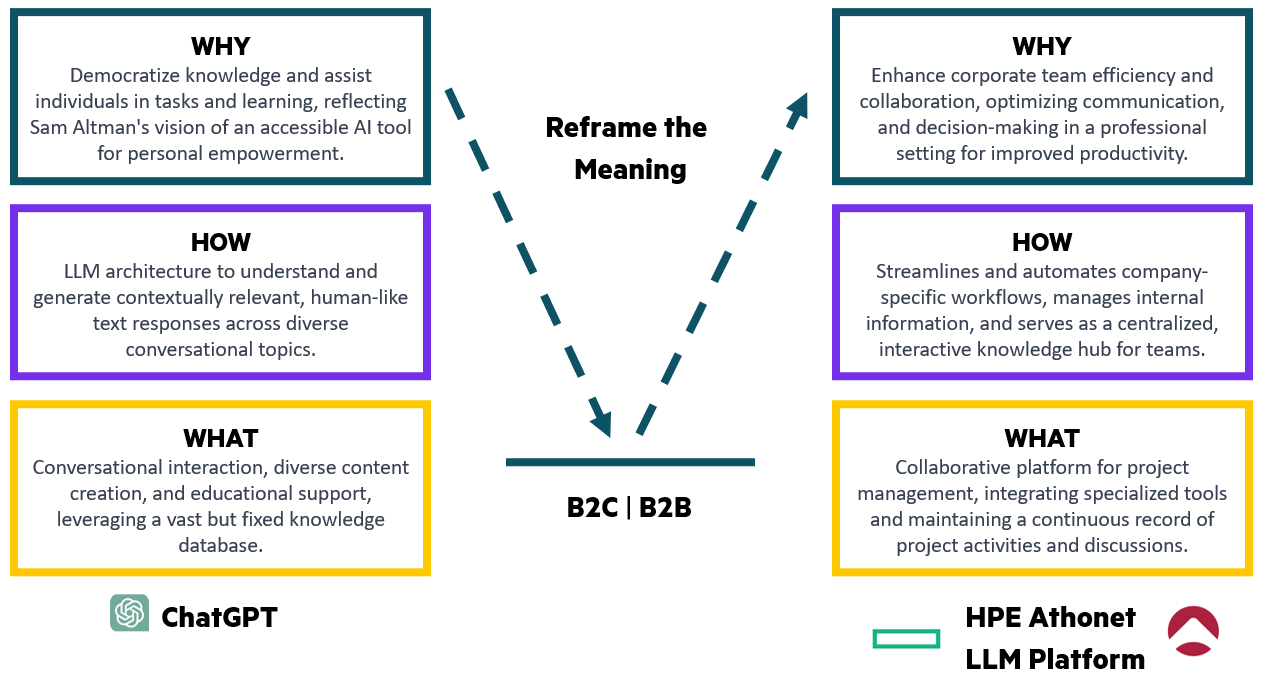
HPE Athonet LLM Platform: From personal assistant to collaborative corporate tool
March 13, 2024As introduced in the previous blog post "The transformative impact of generative AI on Telco products, HPE Athonet is building a product based on three pillars:
- Transitioning to a team-centric collaborative framework.
- Enhancing user experience to promote productivity and task focus.
- Developing a versatile architecture using data mesh principles that also include governance of security and ethical aspects.
Together, these elements represent our commitment not just to technological innovation, but also to fostering a genuine digital transformation in network management using generative AI. This installment delves deeper into the first foundational principles underpinning our strategy: specifically, the shift from utilizing isolated tools to embracing a holistic, team-centric collaborative framework.
Sam Altman, CEO of OpenAI, is on a mission to develop an exceptional personal assistant aimed at enhancing individual learning and support. While this initiative is great, HPE Athonet has found that transitioning from a business-to-consumer (B2C) to a business-to-business (B2B) model necessitates a significant shift in focus from serving individuals to empowering teams. So, our team introduced the following innovation of meaning:

The rationale behind this shift is the conviction that teamwork is fundamental to organizational success. The concern is that if this tool is used solely on an individual basis, it might inadvertently amplify personal biases, complicating communication within teams. By emphasizing teamwork, one signal's a broader perspective on how this technology should be utilized.
To clarify, there are several global initiatives to address and reduce biases in LLMs, particularly those related to data, like the demographic’s ones. These biases can often be minimized or managed using LLMs themselves, employing strategies such as guardrails or reinforcement learning from human feedback methods. Adhering to the HPE AI Ethics principles commits to mitigating these biases.
It is recognized, however, that there is a distinct category: the cognitive biases, which, unlike data biases, receive less focus in academic research and have fewer mitigation strategies available. Cognitive biases, such as confirmation bias, have profound effects on human interaction, potentially leading to polarization also within small social units like teams or departments. In response to this challenge, HPE Athonet is dedicating efforts towards understanding and addressing cognitive biases. The team is fostering environments that encourage diverse perspectives by creating 'shared memory' spaces within projects. In these spaces, employees can contribute with their individual chat memories, facilitating the collection of varied viewpoints and promoting openness and dialogue.
In B2B environments, the transfer of employee knowledge into digital tools is crucial, underlining the significance of the design and presentation of these tools to the workforce. Historically, a common approach towards AI in business has been to automate processes and reduce costs, often at the expense of human resources. HPE Athonet's priority diverges from this path; we prioritize enhancing the intrinsic value of our products, focusing not just on reducing expenses but on adding qualitative benefits.
Despite the advanced nature and associated costs of these technologies, they are viewed as vital investments in promoting collaboration and creativity within teams. The objective is to empower individuals to work more efficiently and to foster innovation through improved teamwork. By leveraging AI's unique capabilities, HPE Athonet aims to augment and elevate human efforts, rather than replace them.
While it is acknowledged that eliminating biases from LLMs is unfeasible, we believe that evolving towards a more collaborative tool can foster an 'anti-fragile' system better equipped to manage and mitigate these biases.
This blog highlights the initial foundational pillar shaping HPE Athonet's upcoming product: the shift towards a team-centric collaborative framework to leverage generative AI potential. It marks the initial step in a strategy that also aims to enhance user experience and develop a secure, ethical, and versatile architecture. These initiatives underscore HPE Athonet's commitment to innovation and the digital transformation of network management. Stay tuned for upcoming posts on the other pillars.
Related

HPE Athonet LLM Platform: Divide et impera, designing the LLM Agentic Tool Mesh
Apr 9, 2024
HPE Athonet LLM Platform: Driving Users towards peak 'Flow' efficiency
Mar 20, 2024
LLM Agentic Tool Mesh: Democratizing Gen AI through open source innovation
Nov 11, 2024
LLM Agentic Tool Mesh: Harnessing agent services and multi-agent AI for next-level Gen AI
Dec 12, 2024
LLM Agentic Tool Mesh: Empowering Gen AI with Retrieval-Augmented Generation (RAG)
Jan 8, 2025
LLM Agentic Tool Mesh: Exploring chat service and factory design pattern
Nov 21, 2024
LLM Agentic Tool Mesh: Orchestrating agentic tools for the AI revolution
Jan 20, 2025